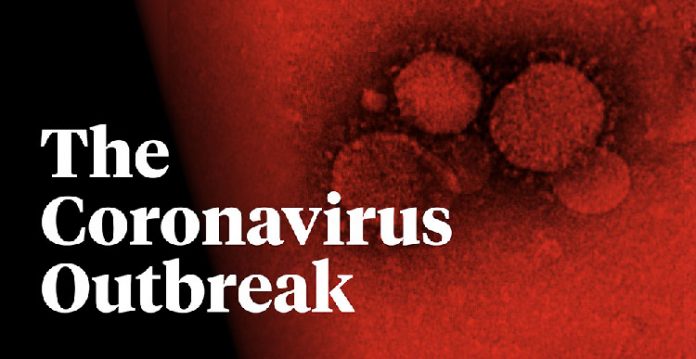
With intensification in every field of technology, we face novel, strange threats whether in the shape of Ebola, H1N1, MERS or presently COVID-19. Novel Coronavirus, also known as COVID-19, is a respiratory tract infection. It spreads through respiratory droplets and personal contact with the infected person and their fomites. Coronavirus has affected almost about 129 countries of the world as a result, in maximum countries, there was nationwide lockdown imposed to break the chain of transmission.
As this disease affects the respiratory tract and also spreads through fomites and respiratory droplets – wearing a mask, physical distancing, proper hand hygiene are the key factors to break the chain of transmission. The incubation period of disease is from 2-14 days. The virus is usually fatal for people with comorbidities like diabetes, CV diseases, respiratory diseases, people undergoing radiation therapy etc. The rapid and extensive spread of this disease became a major challenge for healthcare workers. Even the countries like USA, Italy etc with sophisticated healthcare system bowed down before COVID-19.
The first Covid case in China was confirmed by Wuhan Municipal Commission which reported a cluster of cases of pneumonia in Wuhan, Hubei province. Novel Coronavirus was eventually identified on 31st December, 2019.
According to a report by WHO, first Covid case outside the China was reported on 13th January, 2020 in Thailand. The first Covid case in India was reported on 30 January, 2020 and in Kashmir, first case was reported on 18th March, 2020.
As per the latest data (17th June, 2021) by John Hopkins University, the overall global COVID-19 caseload has gone past 176.9 million, while the deaths have surged to more than 3.83 million.
This outbreak is by far the largest outbreak of atypical pneumonia since the severe acute respiratory syndrome (SARS) outbreak in 2003. This new virus with symptoms of infection including fever, chills, cough, coryza, sore throat, breathing difficulty, myalgia, nausea vomiting and diarrhoea was named as a severe acute respiratory syndrome – Coronavirus (SARS-CoV2) or novel Coronavirus (2019-nCoV), designated by the WHO on 11th February, 2020 as Coronavirus disease (abbreviated as COVID-19).
It is a beta virus like SARS and spreads through intermediate hosts like bats. The symptoms of COVID-19 range from no symptoms (asymptomatic) to severe pneumonia and can lead to death. The evidence from analysis of cases to date is that COVID-19 infection causes mild disease in about 80% of the cases and most cases recover, 14% have more severe disease and 6% experience critical illness. It is reported that older men with medical comorbidities are more likely to get infected and that too with worse outcomes. Severe cases can even lead to cardiac injury, respiratory failure, acute respiratory distress syndrome and even death.
The disease has put the population into devastating fear and the fear is putting the people at greater risk of developing physical as well as mental health issues. Fear causes stress and when we are under stress, the hormones like cortisol and adrenaline increase and they suppress the effectiveness of the immune system. The suppression of the immune system leaves the body vulnerable to disease and infection.
Intact immunity will get over the novel virus, but with fear and weakened immunity, we are at a risk of developing a severe disease. The studies have also shown that stress increases the risk of heart attacks and strokes.
The itty-bitty virus not only paralyzed penurious countries but developed countries are much frightened by this. It has paralyzed the world economy, as stock markets worldwide are showing record-breaking plummets. Global production systems are in danger of collapse, opulent economists are residing in their cosy rooms with fear of death. National and international airlines are closed. Tournaments are deferred, schools, colleges, universities are closed. Nature has locked us and forced us to stay indoors. With the passing days, the fear of death among people is increasing.
Health professionals are working around the clock to fight COVID-19. People are given information about the prevention of novel Coronavirus through print and electronic media. The worst phase of this is people are scared to interact with healthy ones. Even hand shakes are now avoided to elbow shakes. We are now in a crisis.
The world is now pondering about the possible efficacious vaccine, efficacious medicines for symptomatic relief, preventive measures etc. But being a Muslim, it is our duty to thunderbolt the puissant countries via our Islamic rulings. Let us tell them that the holocaust which the present hi-tech world is facing could have been avoided by applying a simple rule of Shariah i.e, “If you hear an outbreak of plague in a land, do not enter it, but if the plague breaks out in a place while you are in it, do not leave that place”.
The need of the hour is that we should follow basic human principles and shun all inhuman behaviours.
Tail Piece:
- We should always be empathetic to people around us.
- In case of any emergency, we should act selflessly to provide helping hand to those in dire need.
- We should always follow coughing etiquettes to break the chain of transmission.
- We should self-isolate ourselves in case we are experiencing the symptoms.
- We should build hope among people and should avoid unnecessary hues and cries to reduce panic among common masses.
- We should avoid stigmatizing Corona patients in the society. Instead, we should accept them whole-heartedly as a part of our society.
- We should try to calm our nerves and take less stress to reduce its effect on our immune system.
- We should wear mask, sanitize our hands.
- We should try to remain indoors, and in case if there is need to go outside our home, we should take necessary precautions.
- It is the duty of educated youth to provide education about disease and its preventive measures to common masses who don’t know much about the disease.
- Last but not the least, hope for the best as world has seen many more pandemics.
Follow Us
The Kashmir Pulse is now on Google News. Subscribe our Telegram channel and Follow our WhatsApp channel for timely news updates!









